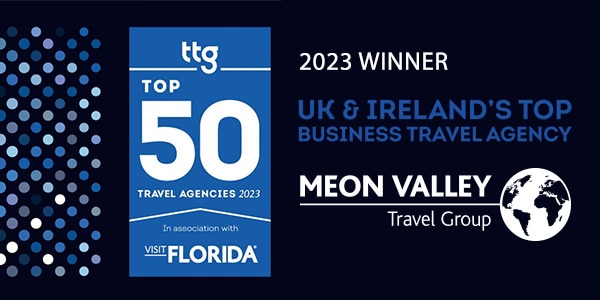James Beagrie sits down for Five minutes with Guy Snelgar, the new Global Business Travel Director at the Advantage Travel Partnership. Listen to their chat below:
Transcript
James: What’s your title Guy?
Guy: I’m Global Business Travel Director.
James: Global Business Travel Director at the Advantage Travel Partnership.
Guy: That’s right, yeah.
James: It’s a pretty powerful role.
Guy: Yes I think I think so yeah.
James: What is your role there and how’s it going at Advantage?
You’ve been there for how long?
Guy: At seven weeks now, seven.
Yes, uh fantastically, well, my role basically is I head up the half of the business we want to call it that of the organization that looks after business travel and works with our business travel members and that includes all of our team members in the UK, but also our global network and also a lot of supplier relationships, so the global accommodation programme and the supplier relationships we have with airlines and those things that are most relevant and most important to business travel.
So all those teams that do all that wonderful stuff. I’m there to lead those teams.
James: Oh wow, so does that means that presumably, you’ve joined Advantage either because it had a compelling proposition or because you were going to be able to help enable or amplify that compelling proposition.
Whether it’s the Advantage one or the Guy Snelgar one, presumably it’s too early to say, but this is not a man without a plan. At this particular point in time, do you have or are you building a giant killing at USP?
Guy: I think the USP is probably already there and I think it’s our scale but also our scope.
So I think the scale in terms of the size of the membership that we have. You know the fact with the second largest TMC network in Europe and the breadth that we have there, but also the scope, I suppose in terms of the range of the membership, so from the very large billion turnover organisations right down to small owner-operators but also unlike similar organisations is we also are in Leisure travel. There aren’t many where you have a membership that has pure business travel, pure leisure travel, and people who do a bit of both.
The scale that we get across the board there, which also means working with suppliers and partners that traditionally have been leisure travel but are now seeping into business travel and vice versa ’cause that old black and white, this is a business travel thing, this is leisure travel thing. Those lines are gone and some of the smart things that are happening in leisure travel I think are seeping into Business Travel and vice versa, so having that UK market presence and you know 70% of the Top 50 TMCs in the UK.
Being that ubiquitous across the industry, we have the buying power, we have all of those things, but to have it across such a broad, diverse range, I think it’s probably the USP.
James: It’s quite compelling to me, of course, ’cause we’ve got business and leisure, and so hopefully we’re the poster child of where you’re going. Thank God I wish I could say we did it by design and by default, but OK, what’s the corporate travel world’s most under-utilized benefit, therefore?
Guy: I think this would be two things I say here, and the first answer may sound a little bit like a plug, but I think it’s genuine, which is I think if you look at the whole corporate travel ecosystem, I would argue the most underused resource probably is the travel management company.
James: Oh, you’ve made my day.
Guy: I know that and I’ll say that’s the bit that sounds like a plug, but actually it’s the management part of the travel management company.
So it is that engagement between corporate traveller, organisation and the TMC and how to manage a programme around the guidance, the expertise, the consultancy, all those kind of things they engage with them at a transactional level, not all, they’re obviously a lot who have fantastic working strategic relationships and you’ve really become effectively a procurement service for travel. But there are still a lot of cases I see where you’re not. You’re a travel booking service and they’re missing out on a huge amount of expertise.
Financial potential savings and benefits for staff, for the travellers, and everything because it is too much of a transactional relationship and they’re not necessarily getting the guidance and the management and expertise they should do from their travel management company.
James: And is that obstructed or amplified by the current circumstances of coming out of COVID and walking into a recession?
Guy: I actually think probably that’s where the big opportunity is because I do think that organisations that previously wanted to transact travel business at the lowest possible cost are now looking at what travel looks like around the world and going this is not as simple as I used to think. There is complexity, there is a potential risk, there is certainly impact on traveller well-being, it impacts on sustainability, there is do I want my people to even carry on travelling the way they used to travel before? And so instead of it being a how can I get my airline ticket at the cheapest possible fee?
It’s a much bigger conversation now, and certainly, I think a lot of it when I talk to management companies.
A lot of the new business they’re getting is not business that’s come from another TMC. It’s companies that used to be unmanaged and do their own travel, but don’t feel comfortable about looking after their own travel programme anymore and want to get professional help.
James: Interesting, OK?
Guy: That’s that was the first bit, the second bit in terms of resource. Actually, if you like within the business, I think it’s data. I think for an industry that seems to generate an untold volume of reports and data and MI, I still think quite often we don’t see that being effectively used. How often is that data actually being used to drive changes to an organisation’s travel programme or changes to the way that an agency works and operates?
It’s the old thing of there’s a lot of data, but not much management intelligence, or business intelligence sometimes, and I think there’s a lot more that can be done with that. There is still too many things. It’s one of those things we. The capabilities are there, but they are not used effectively and broadly enough, I think across the industry.
James: OK and do you think that therefore when you talk about what you mentioned in the middle of that duty of care and sustainability as well and these are quite compelling arguments, but they, are they overriding the value argument, or are they complementing it?
Guy: I think there’s a change in the balance, I do remember, slightly sort of sarcastically. I remember back to 2008 and I was working for a corporate booking tool that had introduced an environmental sustainability module; loads of green messaging identifying preferred green suppliers, and policy controls to ensure that you know you took the Eurostar Paris instead of flying. All of these things because everyone was very into the environment and then we had the credit crunch and nobody cared anymore for a little while from a corporate buying POV.
Forget all that. Yeah, I know we had that project to show off that I just need to save money now I’ve got travel freeze on.
It is a different conversation now. Definitely the tone of that conversation. I think it was happening pre-pandemic and I think that kind of reset that time to sit back and think about what we’re all doing around business travel has absolutely accelerated it so now more not everywhere but more the sustainability and travel well-being are core pillars of the travel programme going forward and they have specific measurable targets for it. That’s the difference, before was an aspiration, we should really try to travel greener, whereas now, a lot of companies now have specific targets against the volume of travel, how they travel, and the CO2 output of travel and also specific initiatives around travel or well-being that have been thought out and up form part of a company’s strategy. It’s not just a travel programme thing, the company has a strategy for this and the travel programmers had to step up to meet the company strategy on these things.
James: Yes, because the individual traveller at the moment still on the BA website, only clicks less than 1% to pay an extra £2.00 to plant a tree when they make a booking, but it’s a corporate responsibility, and the TMCs, and the ecosystems responsibility to deliver all of that without anybody seeing any additional cost.
Guy: And that’s come down, that’s come absolutely that’s coming through the supply chain because I was talking to a TMC that was doing some work for a shipping company and they’re shipping tankers around the world. Are they really getting sustainability on their flights? Is that going to be on their agenda? But the shipping company’s clients are now asking them to demonstrate their sustainability funds because those people are B2C customers and they have to be able to talk about what they’re doing to support the environment, that’s flowing them through the shipping company that needs to be able to in its marketing collateral, also in its reporting, be very clear about what that’s doing and then that’s driving down now to the Travel Management Company. So, and I think we’re seeing that across the board as the end consumer market has to demonstrate those credentials more, everybody in that supply chain is having to, so it’s become a very real, measurable objective as opposed to an aspirational one.
James: And is that therefore the next big thing in the industry or is there another next big thing in the industry?
Guy: I don’t think I’ve described that as the next big thing, because I think that has been a steady evolution over several years. It’s not going away, but I don’t think it’s a kind of a sea change moment.
I think it’s going to be gradual and then let’s be honest there are companies who are slow to adopt that and will be slow to adopt, that’s a gradual progression and something continuing sort of started before.
What’s the next big change? I think there is one coming around traveller well-being a duty of care and then, and I think the big thing is that the fact that there’s going to be a standard. So the ISO 31030 and you can tell it’s a new thing, yet because we don’t know yet whether it is 31, oh 30s, it’s 31. We haven’t decided the industry way to pronounce it yet, let alone. But there are three one zero three oh.
Because duty of care again has been a little bit of erm I think we’re doing the right thing you know. It feels like we’re taking care of our people. We’re now coming to a world where there are going to be some standards around duty of care and travel or risk management and some things that again can be specifically measured and achieved and approached, and I think that possibly is going to drive a big change in behavior.
James: Is that being supported by the NDC ONE Order and having traveller tracking going from door to door with a single booking through the TMC, where a corporate would mandate everything including the taxi, the car hire, the flight, the accommodation, the hospitality, entertainment, meetings and event rooms and even just inflight entertainment or just stuck into one ONE Order, is that gonna be a reality one day because NDC stands for New Distribution Capability and yet it’s 10 years old already
Guy: Absolutely, and I think you hit the nail. I think the intent of having a one-stop shop for everything having everything through a single place, absolutely, I think, is going to be driven more and more, and that’s been a mantra for travel management companies for a little while. You know you want me to help you with your duty of care, you know, like I have to be booking travel, you have to mandate it. I think that’s going to be changed with standards put in place and organisations having to have an actual documented strategy for how they’re doing this that is going to drive more booking through a single source.
ONE Order? Is one possible solution which may somewhere down the line contribute towards that, but I think you’re exactly right if you look where we are with NDC. it feels like I’ve been talking about it for 10 years. The product is still not where it should be. We are still, I would say really only at the beginning of the journey with NDC so the idea that ONE Order will be the solution to this. It is one thing that may be in the toolkit somewhere down the line, but in all honesty, I wouldn’t want to hang my hopes on that being at being the platform that’s going to make that happen.
James: But it has stimulated the conversation about enriching the traveller’s offering, recognising risk, and value and responsibility. So, from all those aspects, I think it’s a good aspiration, isn’t it? That might not be resolved by a different solution.
Guy: Absolutely, but we have lots of ways to skin that particular cat, I think, but, yes, the intent and the fact also that plays the other thing for total trip management, a total cost of the trip and all of those things again, if it’s only one place, you can do all of that, so there are so many good reasons for going down that road, whether or not that actually ends up being the technical solution to it, I think it’s probably still open to debate.
James: I asked this question of a lot of people when it comes to the Five Minutes With…, and it’s an unfair one, so forgive me, but do you have a favorite after-dinner story that you’re allowed to share?
Is there such a thing in the world of Guy Snelgar?
Guy: There is, I’m not reluctant to tell it because I love telling the story, but other people probably won’t want me to tell it because I probably tell it too often.
It’s nothing to do with travel I should say, I tell it in a business context because it does have a lesson, I think, in business in terms of always being there and ready to pick up an opportunity and not shutting yourself away.
So it comes from my other life from art, I was a musician for quite a large part of my career in travel, travel was the day job and then I was trying to be a musician for a bit and we were lucky enough.
I was in a band and the lead string of the band called Tim Howard is a musical theater legend in my view and had been starring in the Tonight’s the Night musical the World Today at Music in the West End. I’ve got to meet Rod Stewart and Ben Elton who was writing it and I got chatting and I said to Rod, oh, I’m in a band actually, and like I said I was the band. Yeah, yeah, I’m shying away about it. Oh, we’re gigging at the weekend.
We were playing at a place which is no longer there anymore called the King’s Head in Fulham.
At which point, Rod says “Bloody Hell, we used to play there back in the day with Faces, we’ll come down!”
James: OK.
Guy: So Tim has shown up at our rehersal and said, yeah, Rod’s coming on Friday night but is he, bollocks, ‘cause he’s not.
Tim: “No, he said he would” yeah yeah yeah yeah sure. All through the week, this is going on. Yeah, his management sent just one message to make sure there are tickets on the door and this is a bit of a spit and sawdust kind of music venue, old school rock and roll club.
So expectation is very low, but it’s very busy and we’ve soundcheck, we are set-up on stage and there’s a kerfuffle at the back of the room, we’re about to go on and all my mates at the back saying Rod’s here.
Genuinely, he has walked in, shirt undone medallion on show and Penny Lancaster on his arm, Ben Elton on the other arm to come and see the gig. Which is wonderful for us. He’s one of my heroes. I love the kind of old school Faces stuff.
Anyway, we did this show and all my friends have been at the bar with him having a drink. We finished the show and come off stage and he’s gone and we thought well, he came to see us for a moment. You know it’s made our year.
We’re back in the studio the next day and our singer Tim shows up very sheepish.
And this is the moral of the story. He said, I came off stage, I was knackered. I didn’t want to talk to anyone I didn’t switch my phone on until I got home.
I switched it on and there’s a message from Rod, well from Ben Elton actually saying got a bit much for Rod in there and maybe we want to get someone to sign something. We’re down the road at Rod’s Private Club. He’d love to buy the band a drink and have a chat and we didn’t get the message till the next morning. I could have sat drinking the night away with Rod Stewart talking with one my heroes about Rock ‘n Roll and we didn’t get the message.
James: Oh, the fish that got away.
Guy: So that’s the one. Yeah, always leave yourself open for that opportunity, that moment you never know what might come along.
So that’s too long a story for you.
James: No, no no that’s brilliant.
OK, and if we go back into travel, are there any snippets of good advice or travel hacks finally to wind up that you would recommend to a fellow traveller?
Guy: That’s a good one and I kind of don’t feel like a frequent traveller, I used to be a bit for obvious reasons.
I feel out of practice with travel. I’m sure like yourself, I could pack for an overnight trip in three or four minutes, you know exactly what you take you, so you have a standard routine. You know where everything is, Bang Bang Bang, what’s all the fuss? Yeah, and I’ve got out of the practice of that because none of us have been doing it really for a while and changing my job, I’ve probably not been doing it for four or five years now.
So I found myself kind of starting do these trips again and having to think about it again. So I don’t really have any kind of hacks about all these little tricks, I think the thing I would say is I’ve changed the way I think about travel.
I used to be very; there’s a meeting, right I’ll sort out the travel to get there, do that and get out again and I think now I’m starting to think about it just a bit differently in terms of how I can make a trip really valuable and actually I don’t want to be doing all those I had to do a day trip this week to Belfast and it was miserable because we got delayed coming back. So I was up at 05:00 and back at 22:30 and I don’t want to do those anymore. I actually want to know where I can think about what else could I do that would be really useful while I’m there and make it an overnight trip, or make it a two or three-day trip and then not have to go again three weeks later and so it’s actually the trip planning thing. I think just changing the way that I think about planning a trip and the way that I respond to a trip rather than thinking it is somewhere I need to go. It’s more about, OK somewhere I need to go. How can I make the most out of the fact that I’m going to have to buy a plane ticket for that?
Yeah, and if that means staying a bit longer and doing some other stuff and getting some more advantage out of it, possibly in some cases actually, maybe even doing something personal that I want to do rather than just constantly shuffling through airports. Whether that’s advice or perspective, it’s trying to travel less, but travel better and think about why I’m travelling and just do things a little bit differently.
James: It takes us back to a conversation we had previously, doesn’t it where they mixed business and leisure and they try and call it Bleisure. But actually, it’s not, It’s travelling AND working and what is it? It’s Tworking?
All the best Guy, an absolute joy to have spent time with you.
Thank you for spending the time, I know you’re a very busy man and you’ve got God knows how many members that you have to look after in the TMC world, and we’re very privileged to have you speak with us today, much appreciated.
Guy: Absolute pleasure James, thank you so much.






